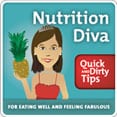Lola writes with a question about eating healthy on the road. “I travel at least two days a week,” she writes, “which leads to countless fast-food and airport meals. Do you have any advice for travelers?”
This article also available as a podcast. Click to listen.
How to Eat Healthy When Traveling
Eating healthy when you’re at home can be challenging enough. Sticking to your good habits when you’re traveling can be even tougher. But there’s no need to arrive home from your trip with a junk food hangover. Here are four tips to help you stick to your healthy eating habits when traveling.
Healthy Eating Tip #1: Take Healthy Snacks with You
Whenever possible, arm yourself with healthy snacks for the car or plane so that you’re not stuck with the limited offerings available at gas stations and airports. If you’re traveling with a cooler, stock it with plain yogurt, hard-boiled eggs, string cheese, fruit, cut-up vegetables, and hummus. Dried fruit, nuts, sunflower seeds, or trail mix travel well without refrigeration—and you’ll usually find a good selection of that sort of thing at the airport newsstand if you don’t have time to shop before you leave.
Healthy Eating Tip #2: Hold Out for the Healthy Options
Healthier options such as salads, grilled sandwiches, veggie or black bean burgers, yogurt, and fresh fruit are also starting to show up at most of the fast food restaurants—and the quality is pretty consistent. Most fast food restaurants now have brochures readily available on the counter that detail the nutritional information of the various menu items. These materials make it much easier to zero in on the better choices.
Or, download the Stop & Go Guide to Fast Food, app, which lists menu items for 70 different fast food joints, color coded red, yellow, or green to help you quickly identify the lesser of two (or more) evils. Nutritional details are also included. When vetting the calorie counts on fast food items, be sure to pay attention to extras like cheese, sour cream, or guacamole.
Believe it or not, it’s also gotten a little easier to find healthy options at rest stops and gas station convenience stores. Of course, you’ll still have to walk through the acres of Funyuns and Krispy Kreme donuts. But check the coolers at the back of the store and you’re also likely to find things like cottage cheese, hard-boiled eggs, raw carrots and hummus, and tomato juice.
Healthy Eating Tip #3: Technology is Your Friend
Although most big corporate chain restaurants now provide nutrition information, independently owned restaurants usually don’t. And part of the fun of traveling is finding those one-of-a-kind places that you can’t find back home.
If you have some time before you leave home, check out Healthy Dining Finder. The website currently lists healthy menu options from tens of thousands of restaurants around the U.S.–including lots of independently owned and fine dining establishments. Nutrition professionals review and analyze menus according to criteria posted on the Healthy Dining Finder website, where you can search the database by location as well as price.
The Best Healthy Eating Apps
If you have a smart phone, there are lots of apps that can help you locate healthy eating options. One of my favorites is an app called Good Food Near You. For my vegetarian, vegan, and gluten-free listeners, check the app store for iVegetarian, Vegan Steven, and Gluten Freed, apps that will help you find restaurants and markets that cater to your needs and preferences.
Healthy Eating Tip #4: Stick to Your Usual Habits
Finally, once you’re at your destination, try to stick to your usual eating habits as much as possible. If your hotel room has a small fridge, for example, stop at a grocery store and pick up whatever you usually eat for breakfast. Starting the day with your usual yogurt or high-fiber cereal rather than the Grand-Slam pancake breakfast will help set the tone for the rest of the day. Eating some yogurt every day when traveling can also help you avoid irregularity, which certainly takes a little of the fun out of traveling.
Originally published at QuickandDirtyTIps.com



